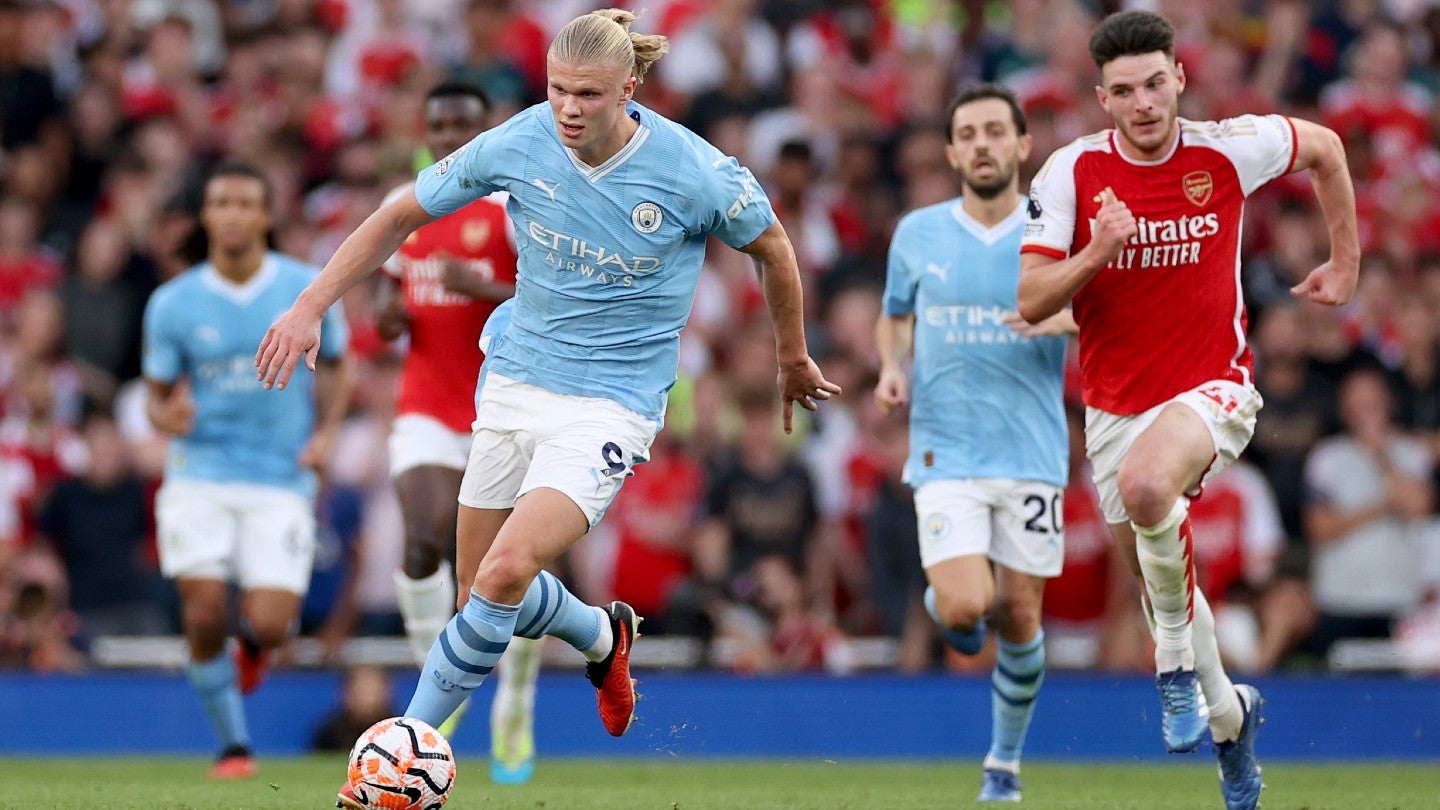
The deal
The deadline for broadcasters in the UK to submit first-round bids for domestic rights to English soccer’s top-tier Premier League (EPL) passed yesterday (November 29), covering the next 2025-26 to 2028-29 cycle.
The Premier League first launched the sale process for domestic rights on October 18, with two invitations to tender (ITT) – one for live and near-live rights and the other for free-to-air highlights.
Domestic rights for the current 2022-23 to 2024-25 cycle bring in £1.62 billion ($1.87 billion) per season, through existing agreements with pay-TV broadcasters Sky and TNT Sports (formerly BT Sport) and e-commerce giant Amazon. Combined, the contracts are valued at £4.8 billion.
The trio have held rights together since the 2019-20 season after Amazon broke the Sky-BT monopoly, marking the league’s first domestic deal with a streaming service.
Highlights are shown by public service broadcaster the BBC, which is reportedly set to retain the rights for the next cycle.

US Tariffs are shifting - will you react or anticipate?
Don’t let policy changes catch you off guard. Stay proactive with real-time data and expert analysis.
By GlobalDataAt present, the 200 available games are split into seven packages shared between Sky, TNT Sports, and Amazon. Sky is the dominant domestic rightsholder, with four sets of rights, equating to 128 matches per season.
TNT Sports owns two packages – one for the Saturday 12.30pm kick-off and the other for two midweek rounds. Amazon bought one package, which allows its Prime Video service to broadcast Boxing Day fixtures and a set of midweek games.
The detail
There are several changes to what is on offer to broadcasters, including the cycle increasing from the traditional three seasons to a four-year period.
The next cycle of rights includes an increase to the number of live matches per season available, from 200 to 270, with five live packages of between 42 and 65 matches per season as opposed to the traditional seven. No single buyer will be allowed to acquire more than four of the five live packages being sold.
All matches in the five midweek rounds per season, and the final match round in each season (when all games are played simultaneously) will be broadcast live.
The current established kick-off slots of Saturday 12.30pm and 5.30pm, Sunday 2pm and 4.30pm, as well as one at 8pm on a Monday (or Friday) are being maintained and will each be linked to one of the five live packages.
For the first time, all matches that are moved to 2pm on Sundays due to club participation in European competitions, will be broadcast live. Currently, only one fixture in the 2pm Sunday timeslot is shown by Sky, meaning several matches are available to watch internationally but not in the UK.
Recent reports have suggested that the league will offer broadcasters four additional televised matches on Sunday, including a new 6.30pm kick-off slot. Matches would reportedly kick off on Sundays between midday and 6.30pm.
As expected, the Premier League’s domestic tender does not include any attempts to present a challenge to the blackout for 3pm fixtures on Saturdays despite widespread calls for this to be scrapped.
Within the same ITT for live audiovisual rights, the Premier League is also offering a single near-live package encompassing near-live long-form rights to 110 non-live matches per season, for linear and on-demand viewing, and short-form clips rights to all 380 matches per season.
The league is also offering its FTA highlights package via a separate ITT. The highlights package includes the right to present an FTA highlights program including coverage of all 380 matches per season and includes catch-up rights as well as certain digital rights.
Why it matters
The league has gone to market with a domestic tender process for the first time since 2018 and will be looking to significantly increase rights fees due to the increase in live matches available and reduction of packages on offer.
Sky and TNT Sports – which was rebranded in July as part of a joint venture with Warner Bros. Discovery – are expected to be major bidders once again, while Amazon and global streaming service DAZN could be in the mix.
However, the reduction in packages could make it harder for Amazon to retain its rights unless it acquires a bigger slice of games.
The league has followed Italy’s Serie A and France’s Ligue 1 in increasing the contract length on offer with broadcasters now allowed to bid for four-year contracts.
Serie A and Ligue 1 recently increased the contract lengths in their respective domestic tenders which are currently on the market.
Conrad Wiacek, head of analysis and consulting at GlobalData Sport, said: “The trend seen across European soccer is rights fees either decreasing or at best maintaining their value. With the streaming wars now claiming casualties, with the likes of Disney and Amazon changing direction and streamlining productions, and the traditional TV powerhouses either consolidating their offering, as with Warner Bros. Discovery, or focusing much more on a core offering of content as in Sky’s case, this leaves the EPL in a precarious position as it heads to market.
“The EPL has been guaranteed an increase on its rights fee in almost every rights cycle since its inception. However, the limit for extravagance may have been reached. Any increase in fees paid by Sky will have to be passed on to consumers, and with a cost-of-living crisis biting, the appetite for paying increased costs for a product that, generously, is not as compelling as it once was, is a tricky argument for the broadcaster to make.
“With less competition in the market – Apple and Amazon will not be driving a bidding war – and WBD focused on NBA rights in the US for next year as well as delivering its Olympic content, the market simply may not be there for the EPL to expect an increase on its previous fees.”



